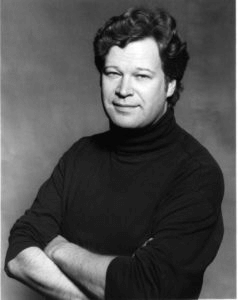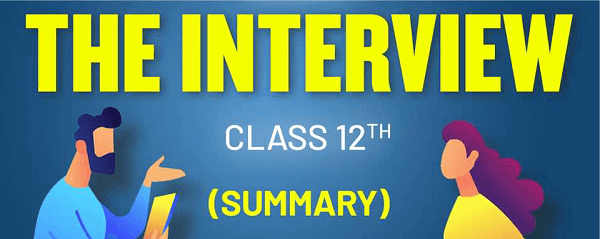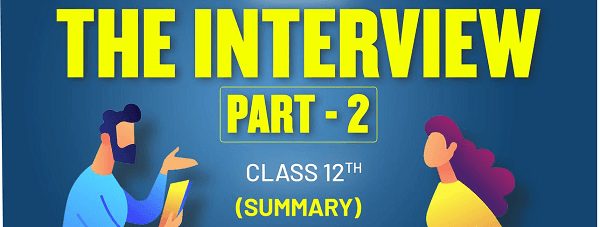The Interview Summary Class 12 EnglishIntroduction to the InterviewThe interview begins with a prologue to establish that it has been commonplace to report since its invention, which happened only 130 years ago. According to the author, it is understandable that people have strong opinions on the use of meetings. Meetings have a lasting impact, and as suggested by a well-known proverb, the first quality of a person's spirit is taken into consideration when judgments are made about them in particular. Distinguished VIPs, academics, and experts have been heard denouncing interviews. In her notebook, Rudyard Kipling's better half described how two columnists ruined their day in Boston. According to Kipling, a meeting is an assault and should be punished. He concedes that a good man would never propose a meeting or ask for one. About the Author
Christopher Silvester (1959) completed his education at Peter House in Cambridge, where he studied history, and at Lancing College in Sussex. He has been writing for Private Eye since 1983 and continued till 1994, and he has been publishing work in both the print and online platforms. One of his noted works is the Pimlico Companion to Parliament. He has also been the editor of The Penguin Book of Interviews: An Anthology from 1859 to the Present Day. His writing repertoire further extends to contributing book reviews and obituaries to the Times of London. Currently, he is in the process of authoring a three-volume social history of Hollywood which will be published by Pantheon Books. SummaryPart 1
The author refers to the long-established "interview" as a journalism standard. Every literate person has read an interview at some point in their life. There have been interviews with a number of celebrities in the past. Therefore, it is understandable that various people's perspectives on interviews vary. While some individuals, such as celebrities, perceive interviews as a victimization tactic, others view them as a source of truth. These people see interviews as an unwelcome intrusion into their lives. The author contrasts the participants' thoughts in interviews with superstitious notions. The author uses the example of how, in former times, people used to think that taking a photograph of someone constituted stealing their soul. The author uses renowned people as examples to highlight the divergent viewpoints in interviews. According to V.S. Naipaul, some people suffer wounds from interviews and lose a piece of who they are. The famed "Alice in Wonderland" author, Lewis Caroll, was afraid of being hailed as a hero and declined to participate in interviews. He was pleased and amused to have all the interviewers be quiet. Rudyard Kipling despised interviews as unethical and humiliating for a decent person. In the latter years of his life, H.G. Wells frequently participated in interviews but found them uncomfortable and spoke with Joseph Stalin. Interviews, in the words of Saul Bellow, "are thumbprints on his windpipe." Interviews are, nevertheless, a cause that the author supports. The term "supremely serviceable medium of communication" is used by him to describe an interview. To make his argument, he uses Denis Brian's words. According to Denis, the most vivid depictions of modern people come from interviews. With the help of one man asking another man questions, the current state of affairs is explained to us. The interviewer thus has a unique level of authority and influence. Part 2
This section presents a segment of a conversation between Umberto Eco, a renowned professor of semiotics based out of the University of Bologna in Italy, and Mukund Padmanabhan of The Hindu. Initially, Umberto Eco's work only appeared in academic publications. All that changed after he published his novel The Name of the Rose in 1980, quickly gaining fame and recognition. More than 10 million editions of the book have been purchased. Umberto Eco was once referred to as a "one man capable of doing everything," according to English author David Lodge, whom Mukund quoted to open the conversation. Umberto replies that although it looks that he is performing a variety of different tasks, in the end he is always confident that he is performing the same deed. He explains that his ideology of nonviolence and peace is eventually represented in all of his works. They are only a collection of ethical and philosophical concerns. Umberto continues by disclosing his secret: he works in what he refers to as interstices," the voids between life. Mukund then offers his opinion on Umberto's approach to producing fiction. In contrast to his serious and dry academic writing style, he notes that Umberto's writing style for fiction is extremely casual and whimsical in character. Umberto remembers presenting his first doctoral dissertation in Italy. One of the instructors made a comment about Umberto Eco's original presentation. Umberto narrated the tale of his study, including its challenges and tribulations, rather than discussing his theories and deriving conclusions by disproving them. Umberto then realized that creating scholastic publications in the form of tales was more practical. Finally, at the age of fifty, this inspired him to begin composing narratives. He describes how his friend Roland Barthes had a passion for writing but was unable to pursue it. Umberto confesses that he has never experienced this level of annoyance in his life. Inadvertently, he had begun to write stories, and they satiated his desire to tell stories. It's interesting to note that Umberto has authored more scholarly papers than the required five fictional books. Mukul was curious as to whether Umberto found it upsetting that most people thought of him as a writer rather than an academician. Because he believed himself to be a university professor who writes books on Sundays, Umberto acknowledged that it did disturb him. He concedes, however, that he cannot expect to write just scholarly pieces on semiotics and aspire to attract a large audience of 1 million readers. The following query relates to Umberto's well-known piece, The Name of the Rose. Mukund finds it amazing that a book about metaphysics, theology, and medieval history could appeal to such a sizable general readership. Only publishers and journalists need clarification, according to Umberto. They presumptuously believe that individuals dislike challenging reading situations. In a world with 6 billion people, if The Name of the Rose sold between 10 and 15 million copies, it signified that this specific group of individuals did not enjoy simple reading experiences. The author refers to the puzzle surrounding why Umberto's book was a hit, given that it focused on a time in medieval history. The American publisher of Umberto's book gave it a warm reception, yet he wasn't certain it would be successful given that the population of the U.S. was only made up of a minority who had seen a cathedral or studied Latin. To his surprise, the book sold a remarkable two to three million copies in the nation. ConclusionThe exposition draws heavily from The Penguin Book of Interviews' introduction. The encounter is the result of correspondence that has persisted. The last chapter of The Interview features the stars' perspectives from the perspective of journalism as well as their insight into a particular aspect of their lives. |
 For Videos Join Our Youtube Channel: Join Now
For Videos Join Our Youtube Channel: Join Now
Feedback
- Send your Feedback to [email protected]
Help Others, Please Share









